
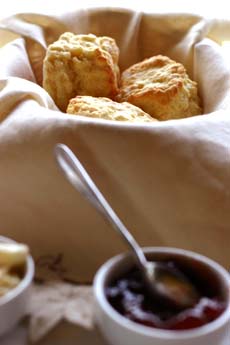
Comfort-food deluxe: fresh-baked scones and artisan preserves. Photo by Joy Neish | BSP.
July 2006
Last Updated January 2015
|
 |
Spread Sheet: Types Of Jelly, Jam & Preserves
Page 2: Terms G ~ Z
This is Page 2 of a two-page glossary. Click on the link below to visit Page 1.
GELÉE
The French word for jelly.
JAM
Jam is made from crushed or chopped fruit cooked with sugar, and often pectin and lemon juice. Jam can be a purée of fruit or have a soft pulp, but it does not contain chunks of fruit. (See photo at top of page.)
JELLY
Jelly is simply sweetened and jelled fruit juice, a clear, bright product. It is generally made by cooking fruit juice and sugar with pectin as a jelling agent and lemon juice as an acid, to maintain a consistent texture. Jelly is firm and will hold its shape (it “shakes”). Generally, jelly contains no pieces of fruit, although specialty jellies, like pepper jelly, may include pieces of jalapeño or other chile pepper. A good wine jelly is made with a concentration of real wine; the better the wine and the more wine in the jelly, the better the wine jelly. A top wine jelly will taste like a glass of wine in jelly form. Read our review of Colorado Mountain wine jelly (photo at right).
|
|
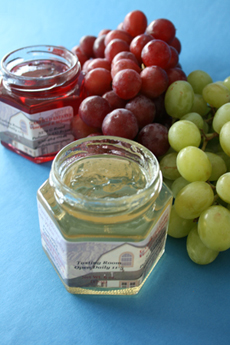
Wine jelly from Colorado Mountain Jams & Jellies is so versatile, it goes from toast to marinade to cheese condiment to ice cream topping. Photo by Hannah Kaminsky | THE NIBBLE.
|
MARMALADE
Marmalade is a soft jelly, often citrus-based, that includes the flesh and often the peel of the fruit suspended throughout the jelly base. The sweetness of the jelly is offset by the bitterness of the peel offsets. Some products that are called marmalade—onion and tomato marmalades, for example—are actually misnamed jams and preserves. Here’s the history of marmalade, which dates back some 2,000 years.
|
|
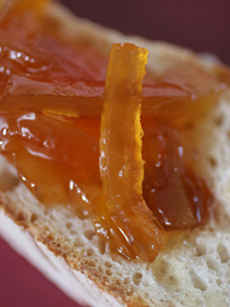
Grapefruit marmalade from Robert Lambert, a NIBBLE Top Pick Of The Week. Photo by Melody Lan | THE NIBBLE.
|
MOSTARDA DI FRUTTA
Called mostarda for short, this Italian condiment is related to savory jam. It consists of candied fruit and mustard-flavored syrup, typically made with essential oil of mustard or mustard powder and white wine. It was traditionally served with boiled meats (bollito misto is a speciality of northern Italian cooking). In recent times, it has become a popular accompaniment to cheeses. Major cities have their own interpretations. Mostarda di Cremona, considered the classic mostarda di frutta, is made with mixed fruits (as is mostarda di voghera). Mostarda di Mantova (Mantua), also called mostarda di mele campanine, is made from small, sour green apples. Mostarda vicentina, from Vicenza, is made with quince and cooked to a jam-like consistency. Mostarda siciliana is made with orange zest, cinnamon, nutmeg, clove and often, toasted
chopped almonds. Mostarda bolognese is made with figs. Mostarda dalmatia is made with quince and honey. |
|
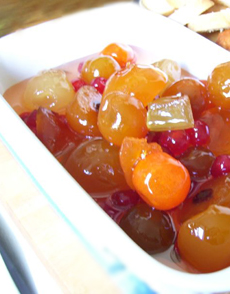
Mostarda di Cremona, in the style of the city of Cremona. Other varieties of mostarda are cooked into a a smooth, jam-like consistency. Photo courtesy Wikimedia
|
PECTIN
The dictionary will tell you that pectin is “a soluble gelatinous polysaccharide that is present in ripe fruits and is extracted for use as a setting agent in jams and jellies.” In other words, it is a water-soluble fiber and a natural thickening agent. Pectin creates a thick, clear set when it gels, as does gelatin, a natural protein thickener derived from animal sources. Gelatin has a broader spectrum of uses, as pectin requires other agents for it to set, such as sugar and citric acid.
PEPPER JELLY
See jelly.
PRESERVE or PRESERVES
A preserve differs from jam in that large or whole pieces of fruit are cooked (with sugar) to the point where the fruit is suspended in a syrup base. The texture of preserves is not smooth like jelly or jam.
WINE JELLY
See jelly.
Recipes With Jams & Jellies
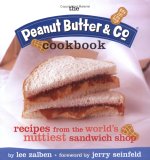 |
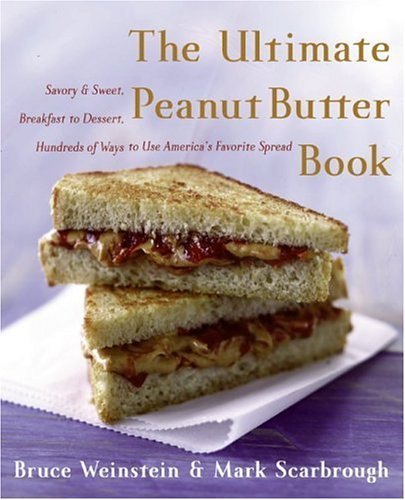 |
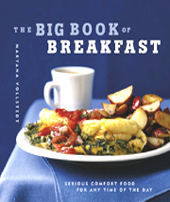 |
| Peanut Butter & Co. Cookbook, by Lee Zalben. More than 80 gooey recipes for everything from decadent desserts (Four-Layer Peanut Butter–Honey Cake) to delicious, nutritious snacks (Baked Apples with Peanut Butter) and sensational entrees (Peanut Butter Pad Thai). Click here for more information or to purchase. |
The Ultimate Peanut Butter Book: Savory and Sweet, Breakfast to Dessert, Hundreds of Ways to Use America's Favorite Spread, by Bruce Weinstein and Mark Scarbrough. From comforting Peanut Butter Sticky Buns to Peanut Butter Cheesecake and an outrageous Elvis Spread, this is way beyond PB&J. Click here for more information or to purchase. |
The Big Book of Breakfast, by Maryana Vollstedt. Choose from 280 recipes for every kind of breakfast food imaginable. Every dish is easy to make: frittatas and omelets, quiches and stratas, casseroles and skillet entrées, sandwiches and wraps, French toast and pancakes, waffles and cereals, meats and potatoes, breads and more. Click here for more information. |

|
 |
|
|








